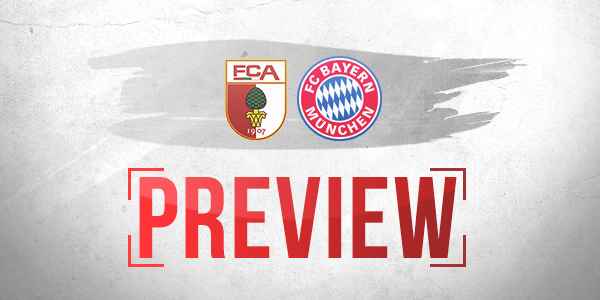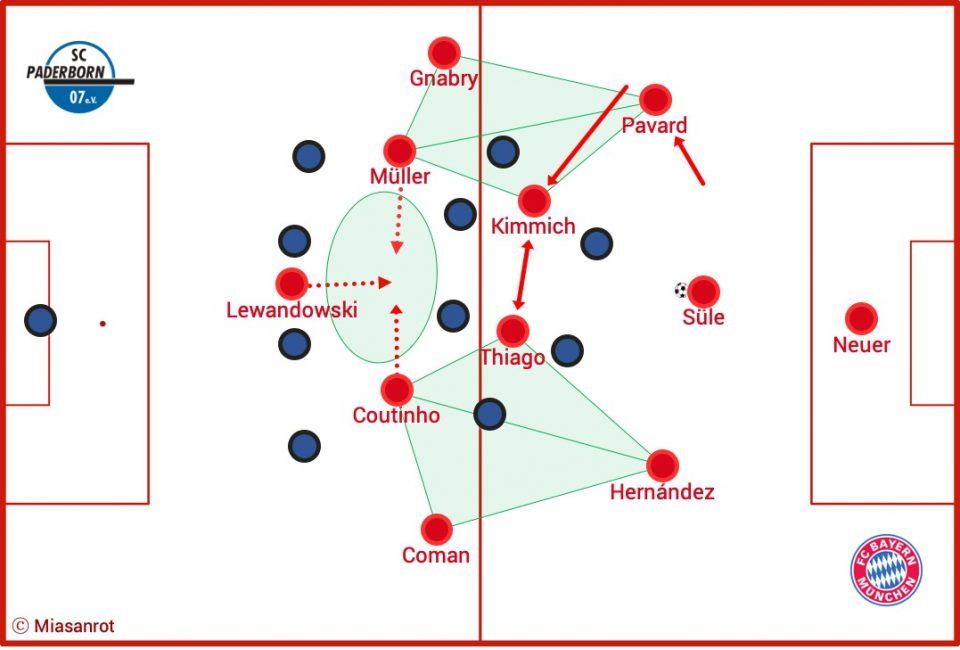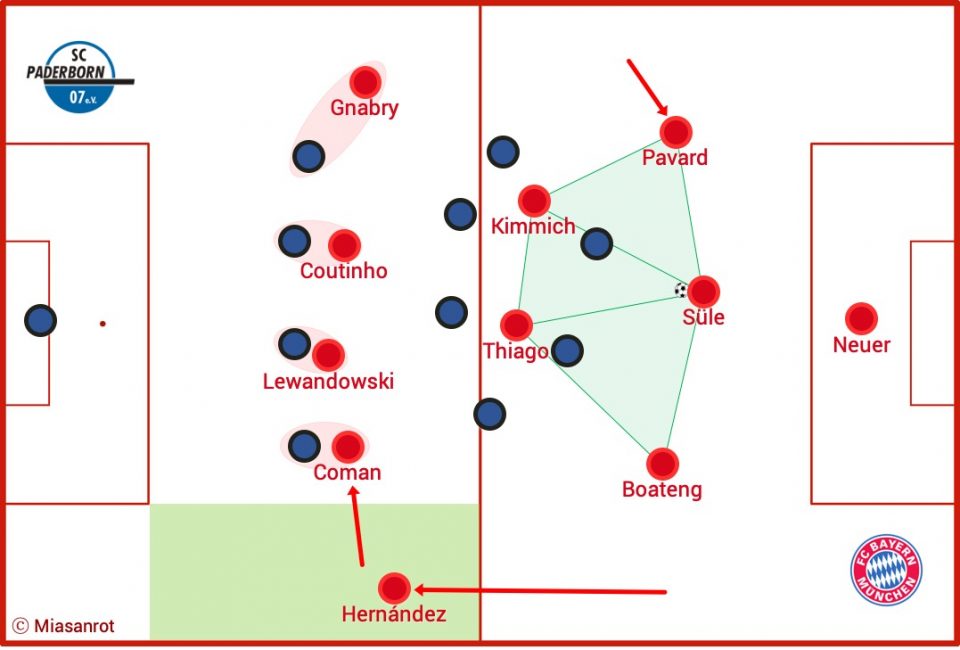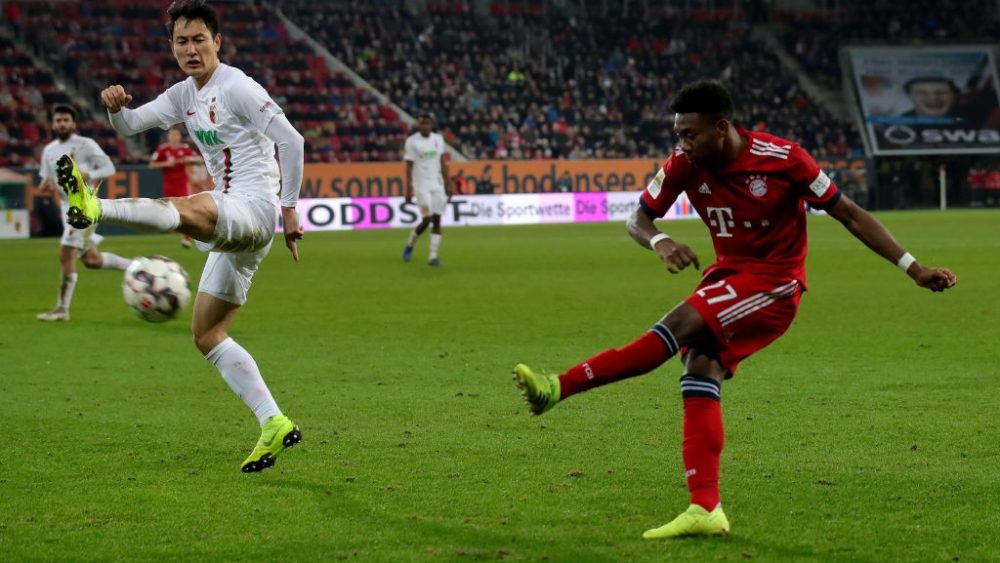Bundesliga MD 08 Preview: Augsburg against Bayern
Niko Kovač was visibly disappointed after the 1-2 home defeat against Hoffenheim: “the last impression is always the one that remains”, he said in a statement after the match and added: “and now this is the impression of a defeat that we have to deal with.”
There was not much opportunity to do so, however, as most players were away on international duties. The situation is different at Augsburg. Although a degree of restlessness has been building at the club after a poor start to the season, the international break seems to have come as a welcome respite.
“We will look at everything, we will question everything. I, myself, our approach – have we been to aggressive? Have we been to open at the back?”, Martin Schmidt said by way of outlining his agenda for the two weeks. In contrast to Bayern, he only had to do without five players with more than 100 minutes of game time each.

FC AUGSBURG: DISAPPOINTING START
But what exactly is the problem of his team? Augsburg seems to have a decent squad on paper and Schmidt is a coach who is familiar with relegation battles. In addition, Augsburg has managed to establish itself as a permanent member of the Bundesliga since their promotion in 2011.
But the club has been on a downward trend lately. Last season, they only managed to win 32 points, a result that would have saved them from relegation only four more times during the last ten years. Maybe there were too many excuses for this: bad luck with injuries, bad luck with results, bad luck at converting chances – our statistical analysis from February of last year showed that the team actually used to deliver quite decent performances.
Nevertheless, the club has collected only five points from one win and two draws in the first seven games so far. They have the most conceded goals with 19, alongside Paderborn. An extrapolation of their current run of form to the rest of the season would see them end with 24 points and 92 goals against – and most likely being relegated.
Baier as the saviour?
There ist still a long way to go, but the performance in the early phase of the season should raise red flags. Sporting director Reuter said after the end of last season in May that the 2019/20 season should be much less eventful and that they intended to secure a safe place outside the relegation zone as soon as possible. At the moment, however, a relegation battle till the end is looming.
One of the biggest concerns: lack of compactness. The team is consistently unable to defend the all important horizontal and vertical half spaces. When Augsburg moves up, significant gaps appear between defense, midfield, and attack with too much regularity. The two forwards can thus be easily overplayed when they try to press in the first line.
Augsburg’s midfield has not been able to create a balance between defense and attack so far this season, provoking poor decisions in all parts of the team. At least Daniel Baier, Augsburg’s pivot and main strategist in the center, is about to return to the first team from an injury. Baier is able to provide structure, balance and a element of calm to Augsburg’s game, qualities that it has been desperately missing lately.
Susceptible to injuries
Horizontally, too, Augsburg has difficulties striking a proper balance between width and compactness. They keep a very tight shape, which forces the players as a group to constantly shift form left to right in following the movement of the ball. Hence, if the ball is on their own right side of defense, the opposite left side of the pitch is left wide open, allowing the opponent to elude Augsburg’s pressure with a simple switch of the play across the pitch. The same is true when the ball is in the center. The tightness of Augsburg’s formation allows the opponent to easily switch the play to either wing, where, as a consequence, Augsburg is left understaffed and offers plenty of time and space for the opponent’s wing players to exploit.
Both problems combined render Augsburg extremely vulnerable to sudden switches of the play. Whether high and long or low and short: the distances they have to cover are too great for them to be able to effectively close down the opponent’s players, causing them a lot of discomfort in their game against the ball.
The football statistics portal “WhoScored” evaluates the teams they have listed on the basis of a huge pool of statistical data they collect about each team. Augsburg’s capability to defend attacks through the flanks is rated as “very poor”. This is a direct result of their lack of compactness and the sizeable gaps between the different parts of the team. Their quality in defending the half spaces is considered especially poor. Their opponents regularly manage to create and exploit large spaces between their full-backs and center-backs through quick switches of the play.
Poor at the back and mediocre in attack
WhoScored estimates only one more element of Augsburg’s game as “very poor”: their ability to stay in possession. It should come as no surprise that a team with a focus on transitional play will not continually enjoy long phases in possession. But Augsburg does not have the necessary composure to calm down a game and remain cool and level-headed enough to patiently play out their counterattacks without haste. The result: their own game lacks periods where the team can rest and regroup.
But there is a silver lining: eight goals in seven games is not too shabby a rate and in Florian Niederlechner, they have a reliable striker at the front. He has been involved in six of the eight goals.
Schmidt will have to work on improving his team’s compactness in the coming weeks in order to stabilize the defense. He has made this his priority: “we have to work on the basics”, he proclaimed, refering mainly to the game against the ball. But Augsburg also has to create more dangerous chances. Keeping calmer in possession, a more direct play up high, and becoming better at closing down in gegenpressing – all of this is something Schmidt has to address.
Is Schmidt the problem?
Augsburg has 10.1 shots on goal, which is the worst figure in the Bundesliga. However, “Understat.com” records a value of 0.12 expected goals from open play per game, which is a good value compared to other relegation candidates. So Schmidt will have to work on improving the quantity of attempts without sacrificing quality.
But the structural deficiencies at Augsburg are only one side of the coin. On the flipside, there are a lot of individual mistakes for which the coach can only partially be blamed. A case in point is goalkeeper Tomáš Koubek, who had arrived in the summer for €7.5m and has already committed a number of blatant errors. So the quest for the underlying problems should cast a wider net: is it really the tactical setup by the coach that keeps provoking unforced errors? Or are these mistakes down to the players themselves, who may be short of confidence due to the recent series of disappointing results?
The truth will lie somewhere in between. But one thing seems certain: if Schmidt is unable to find a solution to the problems quickly, the pressure on him will mount. Going back to last season, the club has achieved only three wins in 14 competitive games during his reign. In addition to eight defeats and 38 goals against, this speaks a clear language.
FC BAYERN: RELAPSE INTO OLD TIMES
Bayern too should speak with a clear language at the weekend. They will be best able to capitalise on Augsburg’s weaknesses if they manage to drop the slackness of their performance against Hoffenheim. Their game in the center was not decisive and swift enough and devoid of creative ideas. Hoffenheim controlled the center and forced Bayern to play the ball out to the wings for lack of better alternatives, resulting in predictable and rather harmless attacks.
From a Bayern perspective, this was clearly a step back. A major factor in this is the pivotal role Joshua Kimmich has in Bayern’s build-up game. Before he moved to the holding midfielder position, he had 66 touches as a right-back, as many as Corentin Tolisso in the center, a disproportionately large number. So a lot of Bayern’s build-up play is directed through him. Now if he gets the ball, it is easy for the opponent to collectively shift to his side and obstruct the passing lanes and occupy the spaces he would need to link up and create valuable chances with the wingers and offensive midfielders ahead of him.
If Kimmich plays in the center, however, the opponent concentrates on the middle of the field. He, Thiago and Couthino are technically gifted enough to create open spaces by switching play to the wings, thus allowing the wingers more time and space to initiate attacks. Corentin Tolisso has not been able to offer the same palette of skills in the center as Kimmich so far this season. The French international has his strengths in higher areas of the pitch but is often too hasty and error prone as a holding midfielder. Hence, a predictable and ponderous game such as the one against Hoffenheim is the logical result.
Building a good momentum for Olympiacos
The issue with hastiness, lack of patience, and an overly hectic game has been a recurring one at Bayern. When in the game against Hoffenheim Kovač moved Kimmich to the center and switched to a back three, there was a short period of control which immediately led to the equaliser. But then Bayern quickly tried to force the issue, thus playing into Hoffenheim’s hands.
Taking all of this together, there are three vital conclusions for Bayern. First, Bayern should look to build up their play through the center initially and switch out to the wings late because Augsburg has had difficulties coping with switches of plays.


The second conclusion: Schmidt will be aware of Bayern’s threat when they are allowed to build up through the center before going wide. He might try to counter this by a deeper pressing in midfield that is meant to constrict the space for Bayern’s holding midfielders to act. So Bayern’s center-backs will have to try to find proper angles for their initial passes, while the offensive players have to move into positions that enable them to link up with the midfielders behind them.
Third – and probably most importantly – Bayern needs to keep their cool and be patient in possession. If they tried to wait for a valuable opening more and did not keep rushing their attacks, they would arguably be less susceptible to counterattacks and probably be able to create better chances eventually. Too much haste always favours teams like Augsburg, who thrive on chaos. “It is always the last impression that remains.” It is up to Bayern now to leave a good impression ahead of their trip to Greece.









